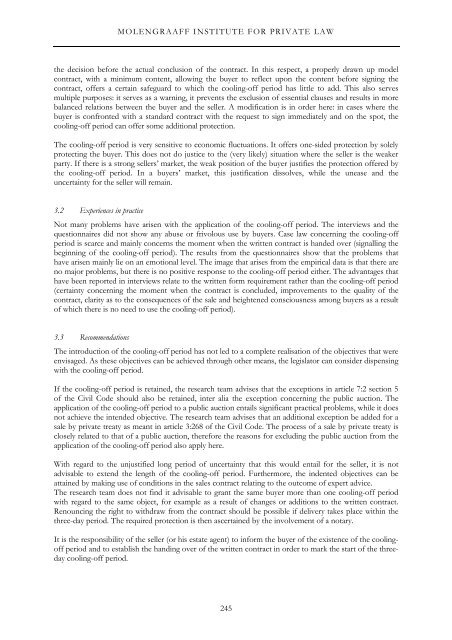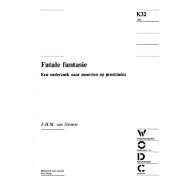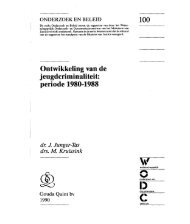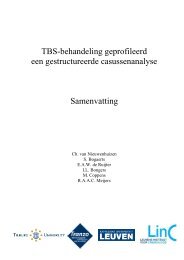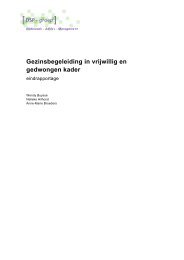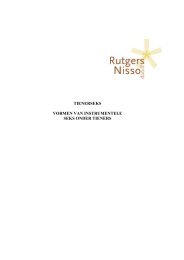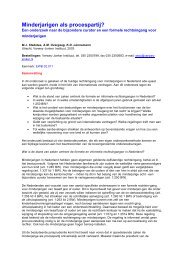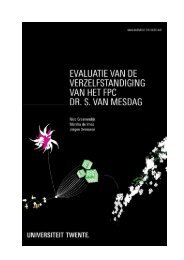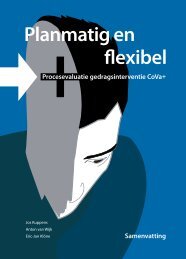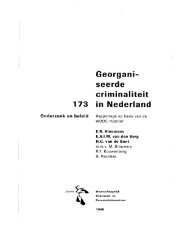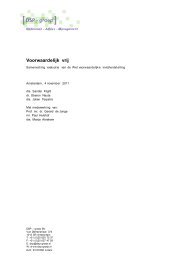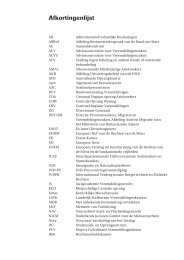Wet Koop onroerende zaken; de evaluatie - WODC
Wet Koop onroerende zaken; de evaluatie - WODC
Wet Koop onroerende zaken; de evaluatie - WODC
You also want an ePaper? Increase the reach of your titles
YUMPU automatically turns print PDFs into web optimized ePapers that Google loves.
MOLENGRAAFF INSTITUTE FOR PRIVATE LAW<br />
the <strong>de</strong>cision before the actual conclusion of the contract. In this respect, a properly drawn up mo<strong>de</strong>l<br />
contract, with a minimum content, allowing the buyer to reflect upon the content before signing the<br />
contract, offers a certain safeguard to which the cooling-off period has little to add. This also serves<br />
multiple purposes: it serves as a warning, it prevents the exclusion of essential clauses and results in more<br />
balanced relations between the buyer and the seller. A modification is in or<strong>de</strong>r here: in cases where the<br />
buyer is confronted with a standard contract with the request to sign immediately and on the spot, the<br />
cooling-off period can offer some additional protection.<br />
The cooling-off period is very sensitive to economic fluctuations. It offers one-si<strong>de</strong>d protection by solely<br />
protecting the buyer. This does not do justice to the (very likely) situation where the seller is the weaker<br />
party. If there is a strong sellers’ market, the weak position of the buyer justifies the protection offered by<br />
the cooling-off period. In a buyers’ market, this justification dissolves, while the unease and the<br />
uncertainty for the seller will remain.<br />
3.2 Experiences in practice<br />
Not many problems have arisen with the application of the cooling-off period. The interviews and the<br />
questionnaires did not show any abuse or frivolous use by buyers. Case law concerning the cooling-off<br />
period is scarce and mainly concerns the moment when the written contract is han<strong>de</strong>d over (signalling the<br />
beginning of the cooling-off period). The results from the questionnaires show that the problems that<br />
have arisen mainly lie on an emotional level. The image that arises from the empirical data is that there are<br />
no major problems, but there is no positive response to the cooling-off period either. The advantages that<br />
have been reported in interviews relate to the written form requirement rather than the cooling-off period<br />
(certainty concerning the moment when the contract is conclu<strong>de</strong>d, improvements to the quality of the<br />
contract, clarity as to the consequences of the sale and heightened consciousness among buyers as a result<br />
of which there is no need to use the cooling-off period).<br />
3.3 Recommendations<br />
The introduction of the cooling-off period has not led to a complete realisation of the objectives that were<br />
envisaged. As these objectives can be achieved through other means, the legislator can consi<strong>de</strong>r dispensing<br />
with the cooling-off period.<br />
If the cooling-off period is retained, the research team advises that the exceptions in article 7:2 section 5<br />
of the Civil Co<strong>de</strong> should also be retained, inter alia the exception concerning the public auction. The<br />
application of the cooling-off period to a public auction entails significant practical problems, while it does<br />
not achieve the inten<strong>de</strong>d objective. The research team advises that an additional exception be ad<strong>de</strong>d for a<br />
sale by private treaty as meant in article 3:268 of the Civil Co<strong>de</strong>. The process of a sale by private treaty is<br />
closely related to that of a public auction, therefore the reasons for excluding the public auction from the<br />
application of the cooling-off period also apply here.<br />
With regard to the unjustified long period of uncertainty that this would entail for the seller, it is not<br />
advisable to extend the length of the cooling-off period. Furthermore, the in<strong>de</strong>nted objectives can be<br />
attained by making use of conditions in the sales contract relating to the outcome of expert advice.<br />
The research team does not find it advisable to grant the same buyer more than one cooling-off period<br />
with regard to the same object, for example as a result of changes or additions to the written contract.<br />
Renouncing the right to withdraw from the contract should be possible if <strong>de</strong>livery takes place within the<br />
three-day period. The required protection is then ascertained by the involvement of a notary.<br />
It is the responsibility of the seller (or his estate agent) to inform the buyer of the existence of the coolingoff<br />
period and to establish the handing over of the written contract in or<strong>de</strong>r to mark the start of the threeday<br />
cooling-off period.<br />
245


